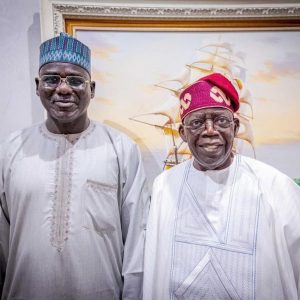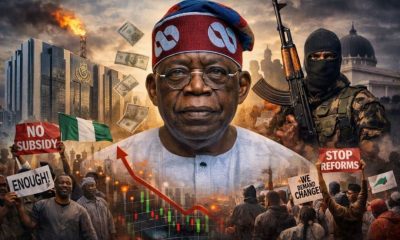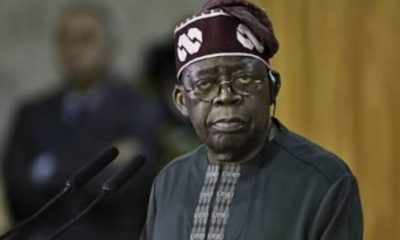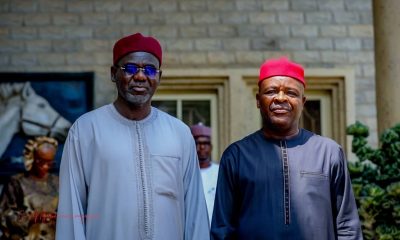society
Gen. Buratai Reveals Why Tinubu is Right on ECOWAS Standby Force
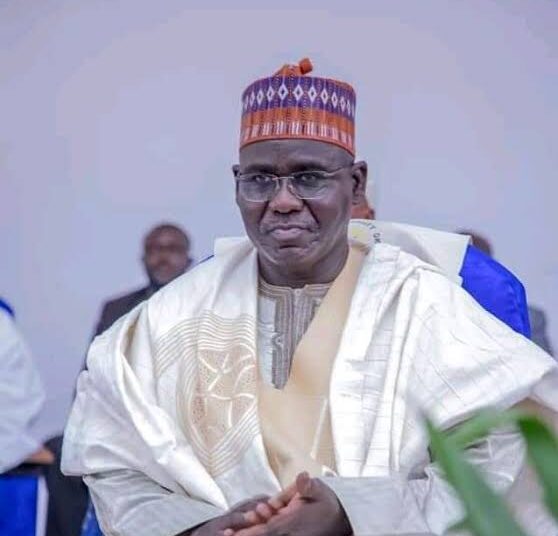
Gen. Buratai Reveals Why Tinubu is Right on ECOWAS Standby Force
Retired Lt. Gen. Tukur Buratai, former Chief of Army Staff and ex-Ambassador to the Republic of Benin x-rays ECOWAS’ challenges and President Bola Tinubu’s proposal of an ECOWAS Standby Force to enhance security of the regional bloc. He spoke exclusively to LOUIS ACHI on the larger emerging geopolitical scenario.
President Bola Tinubu, at the 65th Ordinary Session of the Authority of ECOWAS Heads of State and Government on Sunday, in Abuja, proposed an ECOWAS Standby Force, ESF, for the enhanced security of the regional block.
Yes, that’s correct.
What’s your reading of this move? Is there significant conceptual or doctrinal difference between the proposed standby force and the ECOMOG force in terms of command, control and coordination?
The proposal put forth by President Tinubu, in his capacity as ECOWAS Chair, to establish the ECOWAS Standby Force is truly commendable, and it has my full support. I have been a vocal advocate for the creation of this ECOWAS Standby Force ever since taking on the role of Army Chief back in 2015. The urgent need for such a force is underscored by the myriad security challenges facing the West African sub-region, which require a coordinated and rapid response mechanism to safeguard peace and stability in the area.
The establishment of the proposed ECOWAS Standby Force serves as a significant development in the regional security architecture of West Africa, distinguishing itself from the previous ECOMOG intervention force in terms of command, control, and coordination. Unlike ECOMOG, the ECOWAS Standby Force is designed to operate under a unified command structure, ensuring a more streamlined decision-making process and effective coordination of military operations.
This structure enhances the force’s ability to respond swiftly and decisively to regional security challenges, promoting greater coherence and efficiency in its peacekeeping and crisis management efforts across member states. By prioritizing joint planning, training, and exercises, the ECOWAS Standby Force aims to uphold professionalism and interoperability among its participating contingents, bolstering the force’s overall readiness and effectiveness in maintaining peace and stability in the region.
The ECOMOG (Economic Community of West African States Monitoring Group) Force, established in West Africa in 1990, despite its huge successes, it encountered numerous challenges that impeded its ability to be sustained. One of the key reasons for its setback was the limited resources and logistical support provided to the force.
Inadequate funding and equipment hindered the progress of ECOMOG in carrying out its peacekeeping and crisis management missions. Additionally, the conflicting mandate and weak command structure among the member states of the force led to coordination issues and internal conflicts, undermining its operational efficiency.
Furthermore, external factors such as political interference and lack of international support also affected ECOMOG to achieve its long-term objectives in the region. These collective challenges ultimately prevented the ECOMOG Force from realizing its full potential and sustaining its operations in West Africa. In my opinion, ECOMOG could not have been the foundation on which the ECOWAS Standby Force could have found a formidable root.
As it is now, the ECOWAS Brigade (ECOBRIG) had been formed. What is required now is getting the boots on the ground. When General Ogomudia was the CDS, Nigeria pledged a formidable force. I hope this Force can be mobilised immediately to kick start the ECOWAS Standby Force. The pledged force included infantry and armour units, artillery regiment, signals and a host of others.
Is President Tinubu edging ECOWAS away from its core economic bloc status and trying to inspire a West African “NATO” – which would be an outright military alliance?
ECOWAS, the Economic Community of West African States, stands as a dedicated economic sub-regional group, established with the noble mission of advocating for the economic and commercial interests of the various West African nations. Among its many initiatives, ECOWAS has established the ECOWAS Standby Force, designed not to transform ECOWAS into a militaristic force akin to NATO, but rather to complement the organization’s primary economic objectives in the region.
It is essential to underscore that security plays a pivotal role in fostering economic development; without a secure environment, the West African sub-region would struggle to realize its full economic potential. Presently, the sub-region grapples with a myriad of challenges posed by numerous non-state actors, including terrorist groups, bandits, and criminal gangs, which pose a direct threat to the state’s ability to maintain the monopoly on violence.
In response to these security threats, the creation of the ECOWAS Standby Force represents a strategic move towards leveraging economies of scale to assist member states in tackling security issues effectively. The current security situation in Burkina Faso highlights the daunting challenges the country is grappling with, including a severe shortage of manpower and military equipment.
These deficiencies underscore the immense difficulties faced by the nation in safeguarding its citizens and maintaining peace and stability. These pressing issues are precisely the obstacles that the ECOWAS Standby Force aims to address and assist member states in overcoming, by providing much-needed support and resources to bolster their security capabilities and effectively respond to emerging threats.
What will be the geo-political implication of this course for the continent, given Russia’s current incursion into West Africa through the breakaway ECOWAS members states of Mali, Burkina Faso and Niger – with the West carefully watching and possibly counter-plotting?
The situation is a very dicey one because Russia itself is in West Africa to promote its strategic and economic interest. West African countries and governments must introspect their romance with all these international powers – be it China, Russia or the West. I can tell you that NATO and especially America sees the infiltration of Russia into West Africa as a major threat to its interest especially when these juntas are closing down American and French bases to make for Russia to come in and take over.
As far back as 2023, the United States outlined in its US Security Strategy the significant threat posed by Russia and China to its strategic interests in West Africa. The emergence of these two global powers as key players in the region has raised concerns regarding their potential to challenge US influence and destabilize the security environment.
Russia’s assertive foreign policy and military presence, along with China’s growing economic investments and infrastructure projects, have highlighted the need for the US to closely monitor and address the evolving dynamics in West Africa. The situation is very complex and it is not as simple as these juntas think.
There is a strong possibility that we might witness counter coups in Burkina Faso and Mali or even Niger because of the refusal or delay of these juntas to organize elections and hand over to democratically elected leaders. I agree that the military leaders seemed to enjoy the goodwill of the people but you must know that there will always be few members of their inner circle who will be tempted to overthrow them and rule especially when some of the juntas are saying they will not conduct election till after five years.
The looming threat of coups and counter coups in the region is of grave concern, but what is even more worrying is the possibility of the sub region and the Sahel becoming a battleground for proxy wars waged by international powers, reminiscent of the ongoing conflict in Sudan that is currently unfolding before our eyes.
Recognizing that the success of his proposal requires not only strong political will but also substantial financial resources, Tinubu called out ECOWAS member states on their inconsistent payment of financial commitments to the regional body and also urged them upscale their own respective defense budgets. Do you agree with this seemingly hardline position
I am in complete agreement with President Tinubu’s stance that ECOWAS member states must demonstrate consistency in meeting their financial obligations to the regional body and, ideally, enhance their defense budgets. Reflecting on the past, during the ECOMOG era, Nigeria bore the significant burden of investing approximately $8 billion to restore stability in Liberia and Sierra Leone, while other member nations failed to contribute financially. Such lack of commitment is concerning, and it is imperative that as a regional bloc, we take ownership and address our challenges head-on to garner respect and credibility on the global stage.
On September 16 2023, Burkina Faso, Mali and Niger signed a new mutual defence pact named the Alliance of Sahel States. This essentially signals significant discontent with alleged “ineffectiveness” of ECOWAS and their disillusionment with the West – and Russia is capitalising on this trend. How does this rebellion impact President Tinubu chairmanship of ECOWAS and how should he proceed with engaging this new competitor-bloc to ECOWAS?
The decision made by these three African countries to enter into a new mutual defense pact was primarily influenced by the absence of a robust entity like the ECOWAS Standby Force and the threat of force by ECOWAS against Niger Republic. Given that all three countries are governed by military juntas, they felt the need to band together to defend themselves.
With a collective population of 76.1 million and a combined GDP of $55 billion, their disassociation from ECOWAS represents a significant setback for the organization, particularly for President Tinubu, who is actively working as the Chairman to reintegrate them back into the ECOWAS framework.
I understand that the required procedure for member states who wish to exit ECOWAS involves providing one year’s notice to the organization. These three countries fulfilled this requirement last January, giving us until January 2025 to potentially sway them to reconsider their decision.
I believe that in the long run, these countries will engage in negotiations with ECOWAS to secure more favorable terms, leading them to ultimately remain within the organization. It would prove challenging for them to prosper and thrive independently without the benefits and support that ECOWAS provides.
Given the political and economic fragility in some member states, especially those that witnessed unconstitutional changes of government, added to terrorist activities and violent extremism threatening to spread from the Sahel region towards the coastal states, what’s the way forward for ECOWAS?
The Economic Community of West African States (ECOWAS) must awaken from its slumber to ensure that true representative democracy flourishes within the sub-region. It is imperative for ECOWAS to take a firm stance on crucial issues such as implementing term limits for elected leaders, promoting good governance characterized by accountability and efficiency, creating economic opportunities for the populace, upholding the rule of law, and fostering inclusivity, among other crucial pillars of democracy.
The recent events, that are the removal of term limits in Ivory Coast, Togo, and, until the recent coup led by Mamadi Doumbaya, Guinea, serve as stark reminders of the fragility of weak democracies that lack the genuine support of their people. The scenes of unrest and public discontent in these nations point to the urgent need for ECOWAS to step up its efforts in safeguarding democracy and ensuring that leaders are accountable to their citizens.
The widespread public demonstrations in Niger in support of General Tchiani following the overthrow of President Bazzoum, as well as the jubilation on the streets of Conakry, Guinea, after Colonel Doumbaye removed President Conde from power, underscore the deep-seated dissatisfaction and lack of popular support for those in leadership positions.
It is high time for ECOWAS to prioritize the consolidation of democratic norms and practices across the region to avert further political instability and ensure the legitimate representation of the people’s will. No soldier in his right mind would dare to challenge the stability of a government that is deeply cherished and widely supported by its people.
It is, therefore, imperative for ECOWAS to prioritize the establishment of effective democratic systems across the sub-region. Additionally, ECOWAS must play a pivotal role in fostering economic integration within the sub-region, facilitating seamless movements of people and goods. The delayed implementation of the proposed ECO currency within the ECOWAS sub-region raises concerns and underscores the need for swift action.
society
Ramadan: Adron Homes Felicitates Muslims, Preaches Hope and Unity

Ramadan: Adron Homes Felicitates Muslims, Preaches Hope and Unity
Adron Homes & Properties Limited has congratulated Muslim faithful on the commencement of the holy month of Ramadan, urging Nigerians to embrace the virtues of sacrifice, discipline, and compassion that define the season.
In a statement made available to journalists, the company described Ramadan as a period of deep reflection, spiritual renewal, and strengthened devotion to faith and humanity.
According to the management, the holy month represents values that align with the organisation’s commitment to integrity, resilience, and community development.
“Ramadan is a time that teaches patience, generosity, and selflessness. As our Muslim customers and partners begin the fast, we pray that their sacrifices are accepted and that the season brings peace, joy, and renewed hope to their homes and the nation at large,” the statement read.
The firm reaffirmed its dedication to providing affordable and accessible housing solutions to Nigerians, noting that building homes goes beyond structures to creating environments where families can thrive.
Adron Homes further urged citizens to use the period to pray for national unity, economic stability, and sustainable growth.
It wished all Muslim faithful a spiritually fulfilling Ramadan.
Ramadan Mubarak.
society
Underfunding National Security: Envelope Budgeting Fails Nigeria’s Defence By George Omagbemi Sylvester

Underfunding National Security: Envelope Budgeting Fails Nigeria’s Defence
By George Omagbemi Sylvester | Published by saharaweeklyng.com
“Fiscal Rigidity in a Time of Crisis: Lawmakers Say Fixed Budget Ceilings Are Crippling Nigeria’s Fight Against Insurgency, Banditry, and Organized Crime.”
Nigeria’s legislature has issued a stark warning: the envelope budgeting system; a fiscal model that caps spending for ministries, departments, and agencies (MDAs) is inadequate to meet the country’s escalating security challenges. Lawmakers and budget analysts argue that rigid fiscal ceilings are undermining the nation’s ability to confront insurgency, banditry, kidnapping, separatist violence, oil theft and maritime insecurity.
The warning emerged during the 2026 budget defence session for the Office of the National Security Adviser (ONSA) at the National Assembly in Abuja. Senator Yahaya Abdullahi (APC‑Kebbi North), chairman of the Senate Committee on National Security and Intelligence, decried the envelope system, noting that security agencies “have been subject to the vagaries of the envelope system rather than to genuine needs and requirements.” The committee highlighted non-release or partial release of capital funds from previous budgets, which has hindered procurement, intelligence and operational capacity.
Nigeria faces a multi‑front security crisis: persistent insurgency in the North‑East, banditry and kidnappings across the North‑West and North‑Central, separatist tensions in the South‑East, and piracy affecting Niger Delta oil production. Despite declarations of a national security emergency by President Bola Tinubu, lawmakers point to a “disconnect” between rhetoric and the actual fiscal support for agencies tasked with enforcement.
Experts warn that security operations demand flexibility and rapid resource allocation. Dr. Amina Bello, a public finance specialist, said: “A static budget in a dynamic threat environment is like sending firefighters with water jugs to a forest fire. You need flexibility, not fixed ceilings, to adapt to unforeseen developments.”
The Permanent Secretary of Special Services at ONSA, Mohammed Sanusi, detailed operational consequences: irregular overhead releases, unfulfilled capital appropriations, and constrained foreign service funds. These fiscal constraints have weakened intelligence and covert units, hampering surveillance, cyber‑security, counter‑terrorism and intelligence sharing.
Delayed capital releases have stalled critical projects, including infrastructure upgrades and surveillance systems. Professor Kolawole Adeyemi, a governance expert, emphasized that “budgeting for security must allow for rapid reallocation in response to threats that move faster than political cycles. Envelope budgeting lacks this essential flexibility.”
While the National Assembly advocates fiscal discipline, lawmakers stress that security funding requires strategic responsiveness. Speaker Abbas Ibrahim underscored that security deserves “prominent and sustained attention” in the 2026 budget, balancing oversight with operational needs.
In response, the Senate committee plans to pursue reforms, including collaboration with the executive to restructure funding, explore supplementary budgets and ensure predictable and sufficient resources for security agencies. Experts warn that without reform, criminal networks will exploit these gaps, eroding public trust.
As one policy analyst summarized: “A nation declares a security emergency; but if its budget does not follow with real resources and oversight, the emergency remains rhetorical.” Nigeria’s debate over envelope budgeting is more than an accounting dispute; it is a contest over the nation’s security priorities and its commitment to safeguarding citizens.
society
Rev. Mother Kehinde Osoba (Eritosin) Celebrates as She Marks Her Birthday

Rev. Mother Kehinde Osoba (Eritosin) Celebrates as She Marks Her Birthday
Today, the world and the body of Christ rise in celebration of a rare vessel of honour, Rev. Mother Kehinde Osoba, fondly known as Eritosin, as she marks her birthday.
Born a special child with a divine mark of grace, Rev. Mother Eritosin’s journey in God’s vineyard spans several decades of steadfast service, spiritual depth, and undeniable impact. Those who know her closely describe her as a prophetess with a heart of gold — a woman whose calling is not worn as a title, but lived daily through compassion, discipline, humility, and unwavering faith.
From her early days in ministry, she has touched lives across communities, offering spiritual guidance, prophetic insight, and motherly counsel. Many testify that through her prayers and teachings, they encountered God in a deeply personal and transformative way. Near and far, her influence continues to echo — not only within church walls, but in homes, families, and destinies reshaped through her mentorship.
A mother in every sense of the word, Rev. Mother Kehinde Osoba embodies nurture and correction in equal measure. As a grandmother, she remains energetic in purpose — accommodating the wayward, embracing the rejected, and holding firmly to the belief that no soul is beyond redemption. Her life’s mission has remained consistent: to lead many to Christ and guide them into the light of a new beginning.
Deeply rooted within the C&S Unification, she stands tall as a spiritual pillar in the Cherubim and Seraphim Church globally. Her dedication to holiness, unity, and prophetic service has earned her widespread respect as a spiritual matriarch whose voice carries both authority and humility.
As she celebrates another year today, tributes continue to pour in from spiritual sons and daughters, church leaders, and admirers who see in her a living reflection of grace in action.
Prayer for Rev. Mother Kehinde Osoba (Eritosin)
May the Almighty God, who called you from birth and anointed you for His service, continually strengthen you with divine health and renewed vigour.
May your oil never run dry, and may your prophetic mantle grow heavier with greater glory.
May the lives you have nurtured rise to call you blessed.
May your latter years be greater than the former, filled with peace, honour, and the visible rewards of your labour in God’s vineyard.
May heaven continually back your prayers, and may your light shine brighter across nations.
Happy Birthday to a true Mother in Israel — Rev. Mother Kehinde Osoba (Eritosin).
More years.
More anointing.
More impact.
If you want this adapted for a newspaper page, church bulletin, Facebook post, or birthday flyer, just tell me the format and tone.
-

 celebrity radar - gossips6 months ago
celebrity radar - gossips6 months agoWhy Babangida’s Hilltop Home Became Nigeria’s Political “Mecca”
-

 society6 months ago
society6 months agoPower is a Loan, Not a Possession: The Sacred Duty of Planting People
-

 society5 months ago
society5 months agoReligion: Africa’s Oldest Weapon of Enslavement and the Forgotten Truth
-

 news6 months ago
news6 months agoTHE APPOINTMENT OF WASIU AYINDE BY THE FEDERAL GOVERNMENT AS AN AMBASSADOR SOUNDS EMBARRASSING

